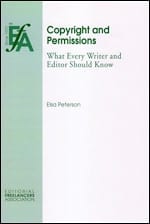Dr. Amy Rebecca Gansell of St. John’s University, Drs. Jan-Willem van de Meent and Chris H. Wiggins, and doctoral candidate Sakellarios Zairis…
Tax tips for authors: Understand foreign taxes, tax credit and tax certification
If you have sold your textbooks in foreign markets, foreign publishers may withhold foreign taxes at the source before the money is paid to your agent and before it is paid to you. If they are doing that, and you earned, for example, $10,000 in a foreign country, 10 percent, or $1,000, will have been withheld from your payment. Your agent would have received $9,000, and withheld his 15 percent commission on the $10,000 you actually earned. So you would end up getting about $7,500.
Tax tips for authors: Learn how your agent is reporting your writing income
One of the things that can affect your tax returns is the income that you report from writing in the form of royalties, advances, etc. Many of you will have literary agents and those agents will report to you what you’ve earned at the end of a year on a 1099. While the IRS says that agencies are supposed to report to their clients the gross income amount that was received, most agencies report on the net basis, and the IRS doesn’t seem to be aware of, or care about that. But as an author, you really need to know on what basis your agent is reporting income because it could potentially affect your tax return.
Subconscious productivity: Accessing your inner self
As a writer, I battle with procrastination, always have. At times I also find it strangely hard to revise my work. But in graduate school I hit upon a way of using my procrastination to produce nearly final copy the first time. The “method” was suggested to me by reading the Autobiography of Bertrand Russell.
Insights on working with editors: An interview with Elsa Peterson
 Elsa Peterson has more than 20 years of experience in textbook and academic publishing as a freelance permissions editor, picture researcher, and developmental editor. Her most recent in-house position was as a senior developmental editor for psychology with McGraw-Hill Higher Education. Peterson recently authored a brief and accessible guide to copyright in the context of publishing titled Copyright and Permissions: What Every Writer and Editor Should Know (New York: Editorial Freelancers Association, 2012). She has also authored numerous articles about the business and craft of editing, and has presented TAA audio conferences on editing and copyright.
Elsa Peterson has more than 20 years of experience in textbook and academic publishing as a freelance permissions editor, picture researcher, and developmental editor. Her most recent in-house position was as a senior developmental editor for psychology with McGraw-Hill Higher Education. Peterson recently authored a brief and accessible guide to copyright in the context of publishing titled Copyright and Permissions: What Every Writer and Editor Should Know (New York: Editorial Freelancers Association, 2012). She has also authored numerous articles about the business and craft of editing, and has presented TAA audio conferences on editing and copyright.
How to use social media as an academic writer
Social media has become an influential force in both our personal and professional lives. According to Mark Carrigan, social media trainer and sociologist at the University of Warwick, social media offers many benefits for academic writers. In a recent TAA webinar entitled, ‘What On Earth Will I Tweet About?’: Feeling Comfortable with Social Media as an Academic, Carrigan shared some of those benefits.
“One advantage of social media for academic writers is that it allows you to have an independent presence online so if you switch institutions, you can still easily be found,” Carrigan said. Since many academics work at multiple educational institutions during their careers, an independent online presence can be an invaluable networking and promotional tool.





